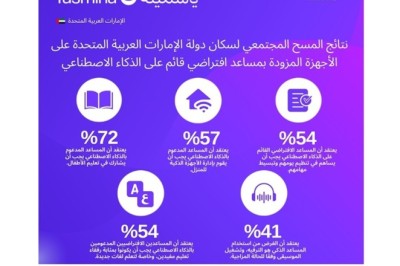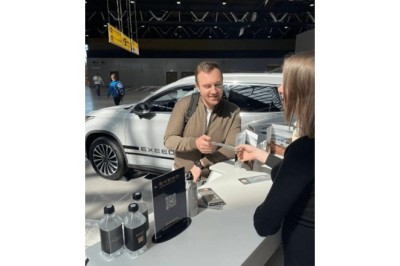
• Seat belt use is the single biggest opportunity to reach the objectives of the ‘UAE Vision 2021’
• Usage is still far below the legally mandated 100% levels
• Usage levels are improving ‘before’ & ‘after’ the new seat belt law
• Education must continue and enforcement must increase
• Key focus segments with low usage levels: the ‘Young’ segment and the ‘Emirati’ segment
Dubai, United Arab Emirates, 4 November 2018, (AETOSWire) : The UAE witnessed the introduction of the holistic seat belt law in July 2017. How did seat belt usage change since the introduction of this ground-breaking law?
RoadSafetyUAE jointly with QIC Insured researched the UAE seat belt usage in February 2017, a few months before the new law got introduced. The results back then were broadly published by UAE’s leading media and gave RoadSafetyUAE and other stakeholders great substance to lobby for the introduction of the then missing holistic seat belt law.
“Now, more than a year after the new law got introduced, we wanted to take a look at how the seat belt usage levels developed”, states Thomas Edelmann, Founder and Managing Director of RoadSafetyUAE. He further comments, “International research shows, that seat belts safe lives between 40-80%, depending on the type of impact and the age of the user (kids/adults). In our opinion, the use of seat belts is the single biggest opportunity to reach the objectives of the ‘UAE Vision 2021’, namely to reduce the fatalities to 3.0 per 100,000 inhabitants (2017: 4.4). To illustrate the massive opportunity of seats belts: a 2017 study of Abu Dhabi Police shows, that 60% of traffic fatalities could have been avoided by the seat belt!”
It is important, that UAE’s motorists are aware of the new holistic seat belt law, and that everyone in a vehicle uses a seat belt and understands the protection seat belts offer. Surprisingly, ‘only’ 82% of respondents know about the new seat belt law and only 71% in the age group of 18-24. Even the meaning of the new law is unclear: only 70% know, that passengers on the back seat must wear seat belts! This value drops to 62% for the young age group (25-29 yrs.).
Comparing the seat belt usage trends ‘before’ (survey of Feb. 2017) and ‘after’ (survey of Sept. 2018) the introduction of the new seat belt law, we noticed overall improved trends:
‘Before’ ‘After’ Trend
Drivers ‘always’ using the seat belt 69% 72% +3%
Front-Seat passengers ‘always’ using the seat belt 71% 73% +2%
Adult passengers in the backseat ‘always’ wearing the seat belt 11% 27% +16%
Also, the role of the ‘responsible driver’ is improving:
‘Before’ ‘After’ Trend
Drivers ‘always’ asking passengers to wear seat belts 49% 56% +7%
Do you have proper child seats/boosters? 66% 76% +10%
Do you ‘always’ ask your children to actually use the child seats/boosters? 70% 75% +5%
However, it must be stated, that all these mentioned values must be at 100%, according to the new law! Some of the usage levels still are alarmingly low – for example on the back seats!
There is still a long way to go, both in further educating the use of seat belts as well as strictly enforcing the use! This is especially true for the segments of ‘young’ drivers and the segment of ‘Emirati’ drivers, as these 2 segments show below-average values, for example:
Survey Results September 2018 Overall Key Segments Description of Key Segments
Drivers ‘always’ using the seat belt 72% 61%; 62% Emirati; 18-24yrs
Front-Seat passengers ‘always’ using the seat belt 73% 54%; 64% Emirati; 25-29yrs
Adult passengers in the backseat ‘always’ wearing the seat belt 27% 15%, 20% Arab Expat; 18-24yrs
Drivers ‘always’ asking passengers to wear seat belts 56% 44%; 46% Emirati; 18-24yrs
Education efforts must aim at addressing the main reasons for non-usage. These reasons have not changed much in between the 2 survey dates:
You mentioned that you don't always wear your seat belt or ask your passengers to do so. Please tell us why? Why don't you have proper child seats or booster cushions for your children?
When I sit on the back seat, I feel safe enough without seat belt 51%
I don't know which child seat or booster cushion to buy for my kid
27%
On short trips, it is not needed to wear seat belts
32%
My kids don't like to be strapped in child seats or booster cushions
24%
I am a safe driver and I will not be involved in an accident
17%
Too expensive
24%
Passengers holding kids is as safe as child seats or booster cushions
23%
I am a safe driver and I will not be involved in an accident
19%
The September 2018 study was commissioned by QIC Insured and RoadSafetyUAE and was conducted by YouGov in, based on the views of a representative sample of 1,016 UAE residents.
The February 2017 study was commissioned by QIC Insured and RoadSafetyUAE and was conducted by YouGov in, based on the views of a representative sample of 1,008 UAE residents.
Details be found in the ‘featured research’ section on http://www.roadsafetyuae.com/statistics/



















Facebook Conversations
Disqus Conversations